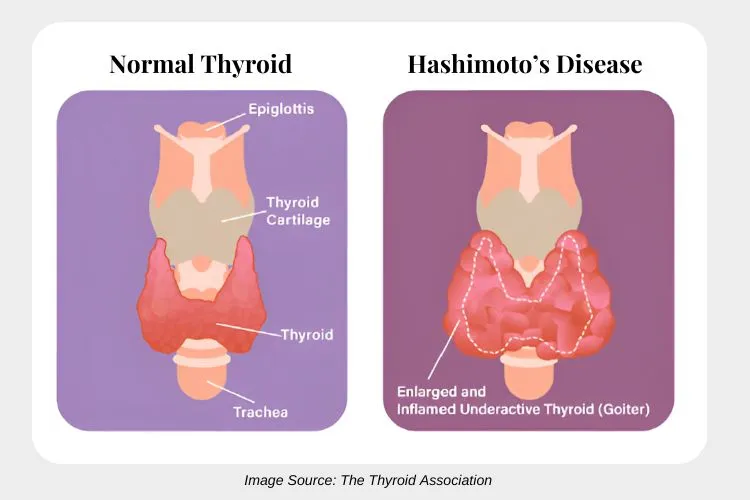How to Take Control of Hashimoto’s: A Guide to Understanding, Identifying, and Managing Thyroid Health

How to Take Control of Hashimoto’s: A Guide to Understanding, Identifying, and Managing Thyroid Health
The thyroid gland, often called the body’s thermostat, is responsible for regulating metabolism, energy levels, and even mood. When this small gland isn’t functioning properly, it can lead to a range of symptoms that affect daily life. One common culprit behind thyroid dysfunction is Hashimoto’s thyroiditis, an autoimmune condition where the immune system mistakenly attacks the thyroid. If you’re feeling tired, foggy, or experiencing unexplained weight changes, hair loss, or anxiety, Hashimoto’s could be worth exploring.
Overview
Hashimoto’s disease is also known as chronic autoimmune thyroiditis or chronic lymphocytic thyroiditis. The condition is most prevalent among middle-aged women, although it can occur in individuals of any age and gender, including children. With Hashimoto’s, the body’s immune system mistakenly attacks the thyroid gland, leading to its gradual deterioration. This ultimately results in hypothyroidism, a condition characterized by an under active thyroid gland that fails to produce sufficient thyroid hormones.
What are the Symptoms of Hashimoto’s?

Hashimoto’s disease often progresses slowly. It may present with a wide range of symptoms, many of which can be subtle and easily mistaken for other conditions. Here are some common signs to watch for:
- Fatigue: Feeling persistently tired, even after adequate sleep.
- Weight Gain: Unexplained weight gain, despite maintaining a healthy diet and exercise routine.
- Sensitivity to Cold: Feeling cold more often than usual, even in mild temperatures.
- Dry Skin and Brittle Hair and Nails: Dry, flaky skin and brittle hair and nails.
- Hair Loss: Excessive hair loss, especially in women.
- Muscle Aches and Pains: Joint and muscle pain, stiffness, and weakness.
- Constipation: Frequent constipation or changes in bowel habits.
- Mental Fog: Difficulty concentrating, memory problems, and slowed thinking.
- Anxiety: Feelings of nervousness, worry, and unease.
- Depression: Feelings of sadness, hopelessness, and a lack of motivation.
- Menstrual Irregularities: Changes in the menstrual cycle, such as heavier or lighter periods, or irregular cycles.
- Goiter: A visible swelling in the neck due to an enlarged thyroid gland.
- Puffy Face: A swollen appearance of the face.
- Enlarged Tongue: A thickened or enlarged tongue.
Importantly, these symptoms can vary in severity and may not be present in all individuals with Hashimoto’s disease. If you experience any of these symptoms, you should consult with a healthcare professional for proper diagnosis and treatment.
What Causes Hashimoto’s?
Hashimoto’s develops from a combination of factors—genetic, nutritional, environmental, and lifestyle-related. Here’s a closer look:
- Genetics: If Hashimoto’s runs in your family, you may have a higher risk of developing it.
- Nutrition: Deficiencies in key nutrients like selenium, iodine, and vitamin D can affect thyroid function. Without these, the thyroid can’t produce hormones efficiently.
- Environmental Factors: Exposure to endocrine-disrupting chemicals (found in plastics, pesticides, etc.) can disrupt hormone function. Certain infections can also trigger or worsen autoimmune responses.
- Gut Health: Your gut and thyroid are more connected than you think! Poor gut health or imbalances in gut bacteria can lead to inflammation, which may aggravate Hashimoto’s.
- Sex Hormones: Changes in hormones during life stages like pregnancy, menopause, or when taking birth control can influence thyroid health.
How to Identify Hashimoto’s: A Full Thyroid Panel

Hashimoto’s is often missed in routine blood work, which is why getting a full thyroid panel can be helpful. Here’s what to ask for and why:
- TSH (Thyroid-Stimulating Hormone): This is the brain’s signal to the thyroid to produce hormones. If TSH is high, it means your thyroid isn’t producing enough.
- Free T4 and Free T3: These are the unbound thyroid hormones circulating in the bloodstream. Free T4 primarily acts as a precursor that can be converted into Free T3, which is the biologically active form responsible for regulating metabolism and other cellular functions. Low levels of Free T4 or Free T3 may indicate hypothyroidism or issues with hormone production or conversion.
- Reverse T3: This shows how much inactive thyroid hormone is being made. If elevated, it could explain persistent symptoms despite normal thyroid levels.
- Thyroid Antibodies (TPO & TG Ab): These antibodies reveal if the immune system is attacking the thyroid. If antibodies are over 20, it could be a “check engine light” signaling Hashimoto’s.
Nutrition for Hashimoto’s
What you eat plays a big role in supporting thyroid health and managing Hashimoto’s. Here’s what to include in your diet:
Include:
- Fresh Vegetables and Fruits: Nutrient-dense and anti-inflammatory.
- Lean Proteins: Chicken, fish, and eggs support muscle and metabolic health.
- Gluten-Free Grains: Quinoa, rice, and other gluten-free options may help reduce inflammation.
- Healthy Fats: Avocados, olive oil, and nuts help reduce inflammation and support brain health.
- Selenium: Found in Brazil nuts and sunflower seeds, selenium can lower thyroid antibodies.
- Zinc: Pumpkin seeds and chickpeas are rich in zinc, which supports the immune system.
Avoid:
- Gluten: Gluten-containing grains like wheat, barley, and rye can trigger immune responses in some people with Hashimoto’s.
- Processed Foods: These can worsen inflammation and nutrient deficiencies.
- Excessive Sugar: Too much sugar can lead to hormone imbalances and inflammation.
- Soy Products: Soy can interfere with thyroid hormone absorption, so it’s best to minimize it.
- Raw Cruciferous Vegetables: In large amounts, raw veggies like broccoli and cauliflower can interfere with thyroid function. Cooking them helps reduce this effect.
Lifestyle Habits for Hashimoto’s

Managing Hashimoto’s involves more than just what you eat. Your lifestyle plays a key role, too. Here are some habits to adopt:
- Stress Management: Stress can wreak havoc on thyroid health. Try mindfulness, yoga, or deep breathing exercises to reduce daily stress.
- Exercise: Regular movement like walking, swimming, or light strength training helps with energy levels, metabolism, and mood.
- Sleep: Aim for 8 hours of sleep each night. Poor sleep can disrupt hormone balance and exacerbate symptoms.
- Avoid Environmental Toxins: Reduce exposure to environmental toxins, including pesticides, plastics, and other chemicals that disrupt hormone balance.
Therapeutic Supplements for Hashimoto’s

Several supplements can help support thyroid function and reduce inflammation. These include:
- Vitamin D: Low levels are common in autoimmune conditions like Hashimoto’s. Supplementing with Vitamin D can support immune health. Aim to keep levels between 60-80 ng/mL.
- Selenium: Helps reduce thyroid antibodies. A daily intake of 200 mcg can be beneficial.
- Omega-3 Fatty Acids: Found in fish oil and flaxseed, Omega-3s reduce inflammation and support heart and brain health.
- Probiotics: Supporting your gut health can help manage autoimmune responses. You can get probiotics through fermented foods like yogurt and kefir or supplements.
- Low Dose Naltrexone (LDN): Some people with Hashimoto’s find this off-label medication helps modulate the immune system and reduce inflammation.
In Conclusion
Hashimoto’s thyroiditis can feel overwhelming, but with the right nutrition, lifestyle changes, and medical support, it’s a condition that can be managed effectively. If you suspect you may have Hashimoto’s or are experiencing symptoms like fatigue, brain fog, weight changes, or hair loss, reach out to a healthcare provider to discuss getting a full thyroid panel and crafting a plan that’s right for you.
MindStream Can Help.
At MindStream Integrative Medicine, we understand the challenges of Hashimoto’s thyroiditis. Our experienced practitioners will work with you to develop a personalized treatment plan to help manage your symptoms and improve your overall health and well-being.
Our integrative approach includes:
- A Comprehensive Evaluation: Through a thorough evaluation, we’ll delve into your medical history, lifestyle, and current symptoms. We’ll complete and review comprehensive lab work, and develop a treatment plan tailored to your unique needs.
- Personalized Treatment: We’ll offer a range of therapeutic treatments, including traditional medications and/or supplementation.
- Holistic Lifestyle Counseling: We’ll provide guidance on how to implement healthy lifestyle habits, including stress management, regular exercise, quality sleep, and toxin reduction.
- Nutrition Support: Our expert nutritionists on staff can provide further support to create a personalized nutrition plan to support your thyroid health, and reduce inflammation.
To schedule an appointment, call 615.541.9933 or book online.
Additional Resources
Looking for more information? The American Thyroid Association is a great resource for general information on thyroid disorders, including Hashimoto’s. Additionally, the Autoimmune Association is considered a reputable resource for information about autoimmune disorders, including Hashimoto’s.
References
- Tomer, Y., & Huber, A. (2009). The etiology of autoimmune thyroid disease: A story of genes and environment. Journal of Autoimmunity, 32(3-4), 231–239.
- Choi, Y., Chung, Y. S., & Kim, S. W. (2014). The role of vitamin D in thyroid diseases. International Journal of Molecular Sciences, 15(4), 6549-6570.
- Slifka, M. K., & Amanna, I. (2019). Role of environmental factors in autoimmune thyroid disease. Frontiers in Endocrinology, 10, 102.
- Ventura, M., Panigati, S., et al. (2019). Gluten-free diet and its impact on autoimmune thyroid disease. Nutrients, 11(5), 1236.
- Chopra, P., & Cooper, M. S. (2013). Use of low-dose naltrexone in autoimmune and inflammatory diseases. Annals of the New York Academy of Sciences, 1291(1), 55–56.
- Kobayashi, T., & Narisawa, T. (2019). Probiotics and Hashimoto’s thyroiditis: A review of clinical trials. Journal of Clinical Medicine, 8(1), 55.
Disclaimer: This blog post is for informational purposes only and should not be construed as medical advice. Please consult with your healthcare provider before making any changes to your diet, exercise routine, or medication use.


